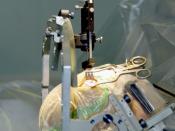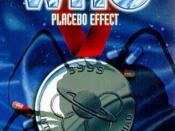The Placebo Effect The activity I chose to write about was on Dr. Walter A. Brown's article in Scientific American about placebos and their effect on the patients. His article described what a placebo is and if it is ethical for doctors to prescribe this "treatment" to their patients.
Dr. Brown, who is a psychologist at Brown University, decided to do a study on the effects of a placebo. A placebo is any treatment or drug with no medicinal value that is given to a patient to relieve symptoms of an ailment. His hypothesis in the article focused on if the placebos had any effect on the patients who took them.
To test his hypothesis, Dr. Brown and his colleagues performed experiments on patients who had depression. To test his idea, he employed what is known as the "double blind technique." This type of experimentation involves that neither the doctors nor the patients know if they are receiving the real "stuff" or simply sugar pills (placebos).
Only the experimenters know who gets what. What this supposedly does is that the patient will mentally think that the doctor is giving him/her the real drug and they will soon be feeling better. When in reality, it is themselves, not the medicine, which makes them feel better. These are the findings of Dr. Brown.
In his experiments on the placebos, he found that the placebo can make a person feel better, but it can also have no effect what-so-ever. In his study of the depressed patients, about 50% of the subjects with normal levels of cortisone benefited from the placebo, whereas, only about 35% of the depressed patients benefited from the drug. This led Dr. Brown to realize that there are other factors in treating depression. He found that the persons with...


